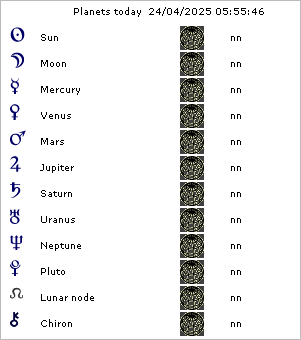|
Venus and Sun
Edited by Lidia Fassio
These two lords share certain interesting things: the great Goddess of love is united to the God of the Sun and shares attraction with it, wants to shine, want to be at the centre of the world. They both attract themselves, Venus for pleasure like and desire and the Sun for life, heat and brilliance.
This love is a Narcissus. Venus is attracted to the I when it is tied to the Sun it never manages to look further and often remains dazzled by its light.
Narcissus has two phases. In the first one he is happy: it does not know anything, does not know the other and thus no perturbation manages to shift him. Then at a certain moment he gets thirsty, stoops in the water, and in that instant, his life is entirely overturned and he is forced to come out of the innocence, looking at his own reflexion. This is the moment in which we can open to the life and to the true potential of one day reaching completion, or we can, as in Mythology, open the doors of death of the I that consists in the incapacity to open-up to others and then in the impossibility of reaching the If.
According to Mythology Narcissus dies because he has refused the love of a nymph. Perhaps Narcissus was looking for a look that would respond to him, and it did not found him because he only sees himself. If we think that in the first months it is the symbiosis with the mother, perhaps the fact that the Sun unites with Venus brings back us to a scarce answer, since the Sun – a male element – does not manage to reflect the look: perhaps there is only fiction, illusion and blunder. Perhaps to Narcissus that game lacked the looks that unites a mother to her child; it is this that creates the conditions for future love, this is the prelude to other meetings and the awareness of them. If the child loves instinctively all that the mirror reflects it is because he already knows it, has perceived it in its contact with the mother before seeing it reflected in his eyes: it is in those points of reference that he has the certitude of being loved and of being.
Narcissus seems to be empty, not being, not having a memory of this first love and therefore he learns to love himself in the moment in which he is reflected: it is undifferentiated, not separate from the original world and then it searches constantly for itself in each single person who he meets; to go beyond this would mean to put a too fragile balance at risk.
Venus-Sun is not an easy archetype that often induces the subject not to take others into consideration, because the Sun has too strong an attraction and tends to prevent the Venus look from going in another direction and from coming away from it. It is a love that is a prelude to any another love but that it does not have the strength of breaking this shell and remains concentrated exclusively on it. This is the great Venus-Sun drama: the identity cannot be sufficiently created and cannot manage to enjoy the parts that derive from the contact with another, and in a certain sense this love remains imprisoned in its “being too self-centred”, without ever being interested in the opposition.
This love lives the initial love; nevertheless then it is not opened, does not open, and then it ends, disappoints, withers and is bent, deflating in a disappointment that is like a wound that is impossible to heal. It is a Casanova who tries: nevertheless it does not look for souls, it only looks for bodies and then it will never be able to join that dimension of energy that it shares and that is run through other sin the meanders of our psyche, to wake it up, to put it in movement and to invite it to know itself.
Venus-Sun represents the first stage of love, that mainly narcissistic one that has something autistic about it, in the sense that you still do hold any interest for other person and therefore substantially it is still not a relationship: it is love in itself which must be the starting point to then join become capable of opening out to the other person. Each time there is a "path" that starts with conquest, however the subject then does not manage to direct his/her libido towards the other person and then returns to the I, in a kind of circular movement that becomes eternal, like a whirl that does not get out of its trajectory. This leads almost always to an obsessive search for “objects“, which nevertheless manage to activate only the centripetal movement of the energy: the person conquers but then leaves, also because there is no other person, and what is activated is only a first step that should allow the following opening and the centrifugal movement of the energy.
In this first stage there is not even symbiosis, there is only and always the sensation of being alone with oneself.
Print this article
|
 |
|



